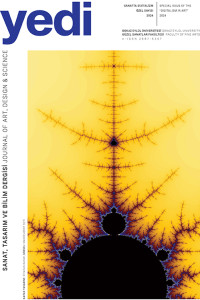Abstract
Human Unreadable, İnsan bedenini gizleyen üç perdelik, bedensel, long-form (uzun biçimli) algoritmik bir koreografidir. Blok zincir üzerine kayıtlı bu çalışma dans, kriptografi, mühendislik, insan-makine etkileşimi, yapay zekâ, makine öğrenmesi ve plastik sanatlara ilişkin birçok disiplini sentezleyen bir yapıya sahiptir.
Bu çalışmanın amacı, Operator ikilisi tarafıdan gerçekleştirilmiş Human Unreadable örneği üzerinden algoritmik sanatın, blok zincir teknolojisindeki yerini ve yeni varolma biçimini ortaya koymak ve web3 sanatının yaratıcılık potansiyellerini tartışmaktır.
Bu örnekte, blok zinciri teknolojisi hem çalışmanın konusunun (beden ve gizlilik) bir parçasıdır hem de çalışmanın formunu oluşturan temel araçlardan biri ve elbette sunuş biçimidir.
Sonuç olarak bu çalışmada olduğu gibi blok zincir üzerine kayıtlı bazı algoritmik sanat çalışmalarının bu teknolojiyi sadece satış, sergileme ya da arşivleme amacıyla değil aynı zamanda konunun ve formun bir parçası haline gelme yani blok zincir teknolojisini yaratıcı bir medyum olarak kullanma özelliği taşıdığını ifade etmek mümkündür. Çalışma ile ilgili elde edilen tüm bulgular literatür bağlamında yorumlanmıştır.
Ethical Statement
Araştırmanın etik kurul izinleri Sussex Üniversite'sinden alınmıştır. Araştırma bilimsel etik ilkeler doğrultusunda yürütülmüştür.
Supporting Institution
TUBİTAK/2219
Project Number
1059B192300128
Thanks
Misafirperverliğinden dolayı Sussex Üniversitesi'ne teşekkür ederiz.
References
- Alizart, M. (2020). Cryptocommunisim. Librebook Press.
- Akten, M., Bucknell, A. Lovink, G., De Filippi, P., Bailey, J., Diamond, C., REAS, C., Lakoubay, F., Jochim, B. ve Estorick, A. (Ed.). (2021). Episode V. toward a new ecology of crypto art: A hybrid manifesto [Bölüm V. yeni bir kripto sanatı ekolojisine doğru: Hibrit bir manifesto]. Flash Art. https://flash---art.com/2021/02/episode-v-towards-a-new-ecology-of-crypto-art/
- Akten, M. (2021). CriptoArt.wtf [Web sayfası]. https://web.archive.org/web/20210309074916/http://cryptoart.wtf/
- Akten, M. (2022). A basic guide to ecofriendly CryptoArt (NFTs) [GitHub repository]. Erişim adresi (01.02.2024): https://github.com/memo/eco-nft
- Aniacatherina.com. (t.y). About. Erişim adresi (01.02.2024): https://aniacatherine.com/about
- Analivia.com.br. (t.y). Compuer dance [Bilgisayar dansı]. Erişim adresi (01.02.2024): https://www.analivia.com.br/computer-dance-3/
- Botz-Bornstein, T. (2022). Bullshit art and NFTs [Saçmalık sanatı ve NFT'ler]. Polish Journal of Aesthetics, 4(63), 21.
- crypto_expert. (2023, June 22). Partially solving the 501 problem of PoW [Gönderi]. Reddit. https://www.reddit.com/r/CryptoTechnology/comments/14g4nk5/partially_solving_the_501_problem_of_pow/?rdt=37175
- hicetnunc.art. (t.y.). Erişim adresi (01.02.2024): https://hicetnunc.art/
- LaViers, A. ve Maguire, C. (2023). Making meaning with machines [Makinelerle anlam yaratmak]. Massachusetts Institute of Technology.
- McDonald, K. (2017a). Ethereum NFT Activity [Web sayfası]. Erişim adresi (01.02.2024): https://kylemcdonald.github.io/ethereum-nft-activity/
- McDonald, K. (2017b). Ethereum Emissions [Web sayfası]. Erişim adresi (01.02.2024): https://github.com/kylemcdonald/ethereum-emissions
- Manchester Üniversitesi. (t.y). 'Europe' plate i: Frontispiece, 'the ancient of days'. Erişim adresi (01.02.2024): https://www.digitalcollections.manchester.ac.uk/view/TW-D-01892-00032/1
- Hobbs, T. (2021). The rise of long form generative art. Erişim adresi (12.02.2024): https://tylerxhobbs.com/essays/2021/the-rise-of-long-form-generative-art
- I Ching. (t.y.). Wikipedia içinde. Erişim adresi (01.02.2024): https://en.wikipedia.org/wiki/I_Ching
- Kantor. (2023). Conversation with Operator on Human Unreadable. Erişim adresi (05.01.2024): https://www.artblocks.io/info/spectrum/conversation-operator-ania-catherine-dejha-ti-human-unreadable
- Lumenprize.com. (t.y.). Metaversal generative art award winner 2023 [Metaversal üretken sanat ödülü sahibi 2023]. Erişim adresi (01.02.2024): https://www.lumenprize.com/2023-winners/2023-metaversal-generative-art-award-winner
- Operator.la (t.y.), About [Web sayfası]. https://www.operator.la/about
Abstract
Human Unreadable is a three-act, corporeal, long-form algorithmic choreography that obfuscates the human body. This blockchain-based work has a structure that synthesizes many disciplines related to dance, cryptography, engineering, human-machine interaction, artificial intelligence, machine learning and plastic arts.
The aim of this article is to examine place and new way of existence in algorithmic art using blockchain technology. This aim is to explore the creative potentials of web3 art through the example of Human Unreadable realized by the Operator duo.
In this case, blockchain technology is both part of the subject matter of the work (the body and privacy) and one of the main tools that form the form of the work and, of course, the way it is presented. As a result, it is possible to state that some algorithmic artworks recorded on the blockchain, such as in this study, have the characteristic of using this technology not only for the purpose of selling, exhibiting or archiving, but also becoming a part of the subject and form, that is, using blockchain technology as a creative medium. All findings obtained from the study were interpreted in the context of the literature.
Project Number
1059B192300128
References
- Alizart, M. (2020). Cryptocommunisim. Librebook Press.
- Akten, M., Bucknell, A. Lovink, G., De Filippi, P., Bailey, J., Diamond, C., REAS, C., Lakoubay, F., Jochim, B. ve Estorick, A. (Ed.). (2021). Episode V. toward a new ecology of crypto art: A hybrid manifesto [Bölüm V. yeni bir kripto sanatı ekolojisine doğru: Hibrit bir manifesto]. Flash Art. https://flash---art.com/2021/02/episode-v-towards-a-new-ecology-of-crypto-art/
- Akten, M. (2021). CriptoArt.wtf [Web sayfası]. https://web.archive.org/web/20210309074916/http://cryptoart.wtf/
- Akten, M. (2022). A basic guide to ecofriendly CryptoArt (NFTs) [GitHub repository]. Erişim adresi (01.02.2024): https://github.com/memo/eco-nft
- Aniacatherina.com. (t.y). About. Erişim adresi (01.02.2024): https://aniacatherine.com/about
- Analivia.com.br. (t.y). Compuer dance [Bilgisayar dansı]. Erişim adresi (01.02.2024): https://www.analivia.com.br/computer-dance-3/
- Botz-Bornstein, T. (2022). Bullshit art and NFTs [Saçmalık sanatı ve NFT'ler]. Polish Journal of Aesthetics, 4(63), 21.
- crypto_expert. (2023, June 22). Partially solving the 501 problem of PoW [Gönderi]. Reddit. https://www.reddit.com/r/CryptoTechnology/comments/14g4nk5/partially_solving_the_501_problem_of_pow/?rdt=37175
- hicetnunc.art. (t.y.). Erişim adresi (01.02.2024): https://hicetnunc.art/
- LaViers, A. ve Maguire, C. (2023). Making meaning with machines [Makinelerle anlam yaratmak]. Massachusetts Institute of Technology.
- McDonald, K. (2017a). Ethereum NFT Activity [Web sayfası]. Erişim adresi (01.02.2024): https://kylemcdonald.github.io/ethereum-nft-activity/
- McDonald, K. (2017b). Ethereum Emissions [Web sayfası]. Erişim adresi (01.02.2024): https://github.com/kylemcdonald/ethereum-emissions
- Manchester Üniversitesi. (t.y). 'Europe' plate i: Frontispiece, 'the ancient of days'. Erişim adresi (01.02.2024): https://www.digitalcollections.manchester.ac.uk/view/TW-D-01892-00032/1
- Hobbs, T. (2021). The rise of long form generative art. Erişim adresi (12.02.2024): https://tylerxhobbs.com/essays/2021/the-rise-of-long-form-generative-art
- I Ching. (t.y.). Wikipedia içinde. Erişim adresi (01.02.2024): https://en.wikipedia.org/wiki/I_Ching
- Kantor. (2023). Conversation with Operator on Human Unreadable. Erişim adresi (05.01.2024): https://www.artblocks.io/info/spectrum/conversation-operator-ania-catherine-dejha-ti-human-unreadable
- Lumenprize.com. (t.y.). Metaversal generative art award winner 2023 [Metaversal üretken sanat ödülü sahibi 2023]. Erişim adresi (01.02.2024): https://www.lumenprize.com/2023-winners/2023-metaversal-generative-art-award-winner
- Operator.la (t.y.), About [Web sayfası]. https://www.operator.la/about
Details
| Primary Language | Turkish |
|---|---|
| Subjects | Fine Arts, Plastic Arts (Other) |
| Journal Section | Değerlendirme Makaleleri |
| Authors | |
| Project Number | 1059B192300128 |
| Early Pub Date | August 31, 2024 |
| Publication Date | November 28, 2024 |
| Submission Date | April 24, 2024 |
| Acceptance Date | June 13, 2024 |
| Published in Issue | Year 2024 Issue: Sanatta Dijitalizm Özel Sayısı |
This work is licensed under a Creative Commons Attribution 4.0 International License.


